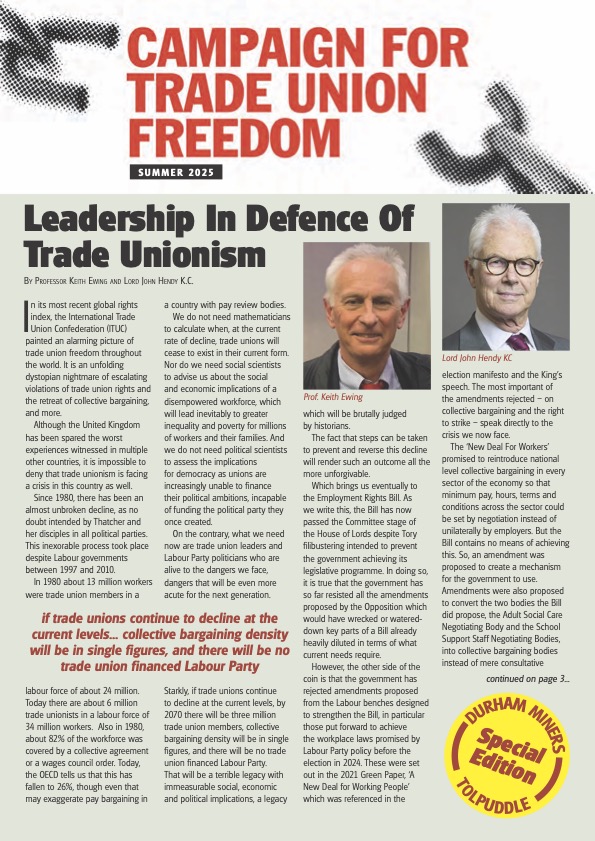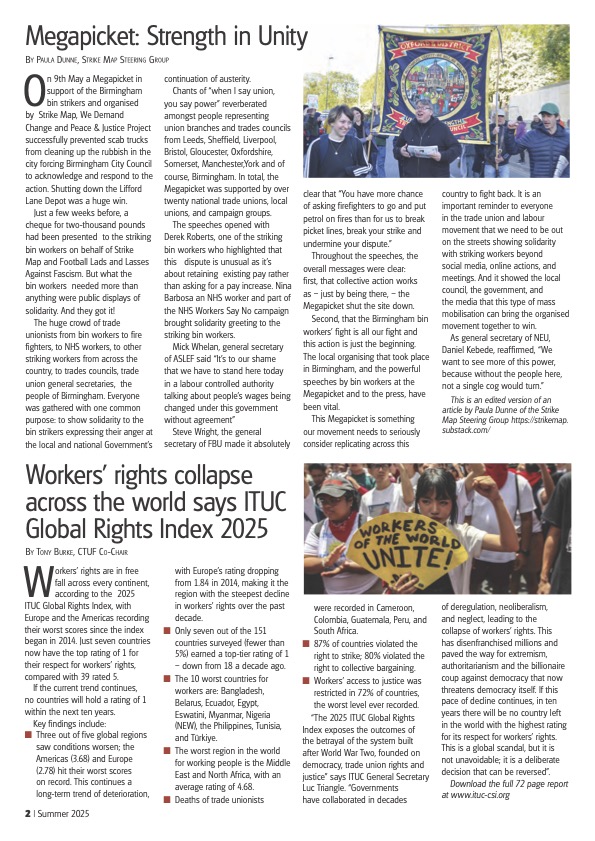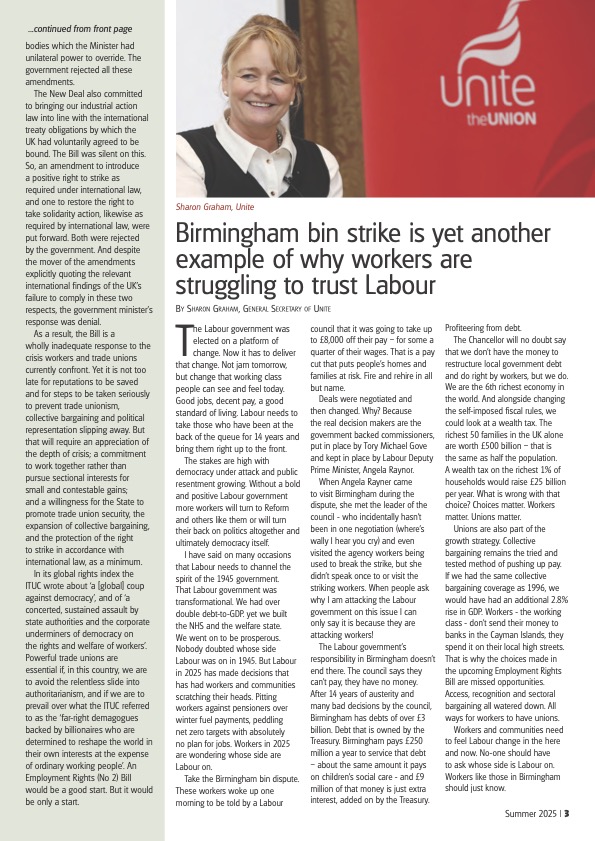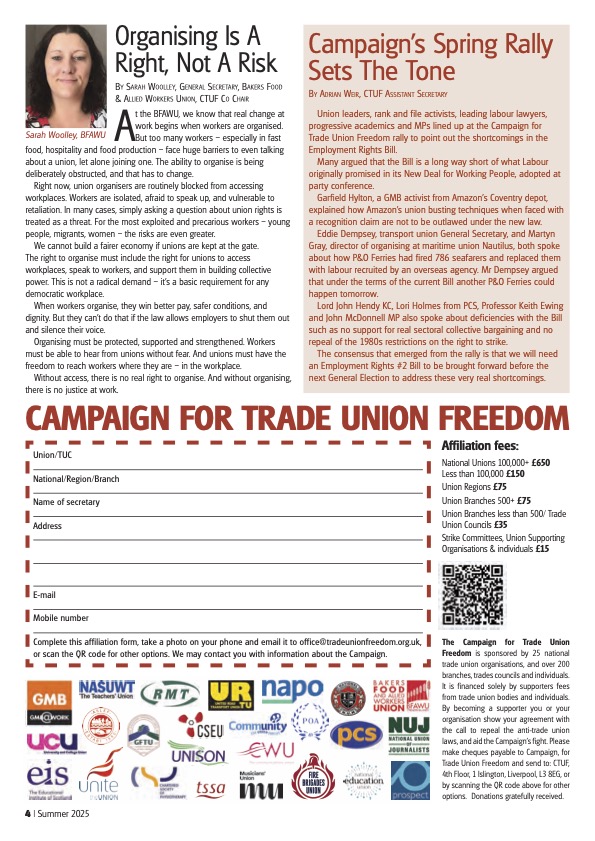
By Adrian Weir, Assistant Secretary of the Campaign for Trade Union Freedom;
It is only trade union power at work that will materially improve the lot of working people as a class but without sector-wide collective bargaining and a right to take sympathetic strike action, we are hamstrung in the fight to tilt back the balance of power.
As we mark, certainly not celebrate, one year of the Starmer government, the Employment Rights Bill slowly grinds its way through the House of Lords, heading towards royal assent and becoming law. Coincidentally the International Trade Union Confederation has just published its Global Rights Index that measures trade union rights around the world.
We know that Britain has some of the most restrictive labour rights in Europe as the multimillionaire lobbyist for the disreputable Tony Blair reminded us back in 1998. So it would be worth using the ITUC’s Global Rights Index as a yardstick to measure by how much, if at all, the Employment Rights Bill will improve the situation in Britain.
Such a measurement may also allow us to verify or otherwise the much vaunted claim by the government that “the Employment Rights Bill could deliver the biggest upgrade in workers’ rights in a generation.”
The context is, as ITUC general secretary Luc Triangle says: “The 2025 ITUC Global Rights Index exposes the outcomes of the betrayal of the system built after World War II, founded on democracy, trade union rights and justice … Governments have collaborated in decades of deregulation, neoliberalism and neglect, leading to the collapse of workers’ rights. This has disenfranchised millions and paved the way for extremism, authoritarianism and the billionaire coup against democracy … This is a global scandal but it is not unavoidable, it is a deliberate decision that can be reversed.”
The ITUC Global Rights Index
The ITUC has found that workers’ rights are in freefall across the globe, including in Europe. The ITUC rates countries on a scale of one to five with one being the most respectful of workers’ rights. The union body says that just seven countries have the top ranking of one (the UK is not in this group) with 39 countries rated at five.
To quote from the ITUC survey: “If the current trend continues, no counties will hold a rating of one within the next 10 years.” Europe hits its worst score on record at 2.78; a rapid deterioration from 1.84 in 2014, the biggest decline of a continental region over the past decade.
Turning to Britain, let’s look at how it fares in the index using the three key criteria; (i) freedom of association/right to organise (ii) right to bargain collectively and (iii) right to strike. Spoiler alert, the UK has a ranking score of four — guilty of systematic violations of rights.
On freedom of association/right to organise, although anti-union discrimination is outlawed the law does not provide adequate protection against it.
Further, the Trade Union Act 2016 gives the certification officer (the government-appointed regulator of trade unions and employers’ associations) intrusive powers to examine a union’s finances and membership records; the Act also introduced the right for the CO to monitor a union’s political expenditure with no corresponding right to monitor employers’ associations or other social actors. The Employment Rights Bill, when law, should remove these powers from the certification officer.
The right to collective bargaining does exist in law but it’s on the right to strike where Britain nosedives, with restrictions on the objective of a strike. A trade dispute must exist between an employer and that employer’s employees — so strikes are outlawed if for political, social or solidarity reasons. After 12 weeks on strike, workers may be fairly dismissed; there is a possibility of replacing workers during a lawful strike and although temporary agency labour cannot be directly used to break a strike it is lawful to hire a replacement labour force through an agency in effect to break a strike.
Many other facets of the anti-strike laws were introduced by the 2016 Act. For example, an obligation to secure an excessive quorum or excessive majority in what are deemed as “essential public services;” the appointment of an identifiable “picket supervisor;” excessively long notice periods; excessively long or complex formalities to call a strike — all of which may be repealed with Labour’s Employment Rights Bill when it becomes law. However, it is the case that most, if not all, of the underlying restrictions on the right to strike were created by laws introduced during the Thatcher and Major period in the 1980s and 1990s which, as we shall see, are not slated to be repealed.
New Deal for Working People and the Employment Rights Bill
Labour conference in 2021 adopted the green paper New Deal for Working People that set out a comprehensive programme to renew rights at work in favour of working people and their unions and redress the 40-plus years of neoliberalism that have diminished the status of working people and their standard of living.
Although there was rumour that the knives were out for the New Deal for Working People at the behind-closed-doors national policy forum in 2023, it survived — in name at least — for inclusion in Labour’s 2024 manifesto and the King’s Speech, albeit with the tagline “Making Work Pay.”
Freedom of association and the right to organise
The New Deal for Working People was quite clear: “Labour will also strengthen trade unions’ right of entry to workplaces to organise, meet and represent their members and potential members, and to contact remote workers … by introducing a transparent framework and clear rules …”
However, this has been downgraded in the Bill to a commitment that a “qualifying trade union” may make an “access request” to the employer for any of the “access purposes.” If the employer consistently denies the access request the union may make a complaint to the Central Arbitration Committee (CAC) which, if upheld, could result in a financial award being made in favour of the union.
So, there has been a transition in the four years since the green paper was published from “trade unions’ right of entry” to trade unions may make an “access request,” which if denied may result in a financial penalty against the employer, not, most importantly, any sort of enforcement notice allowing the union into the workplace.
On the question of trade union recognition New Deal for Working People was clear: “Labour will simplify the law around statutory recognition thresholds, so that working people have a realistic and meaningful right to organise through trade unions.”
Employment lawyers Brodies say that the provisions of the Bill will:
● Reduce the 10 per cent membership threshold for the CAC to accept a trade union application with a test of anywhere between 2 per cent and 10 per cent;
● Remove the requirement for a union to demonstrate to the CAC that there is likely to be majority support for recognition; and
● Remove the 40 per cent support threshold from recognition ballots.
However, all of the changes set out in the Bill still require a ballot of the workforce (the bargaining unit) which invites the employer to hire union-busting consultants or engage in other hostile campaigning that may remain on the lawful side of unfair practices but seek to thwart the union recognition ballot, as happened recently at Amazon.
Labour, in New Deal for Working People, did raise the possibly of automatic recognition “where 50 per cent or more workers in a bargaining unit are members.” Provision for automatic recognition, not via the CAC, is absent in the Bill.
The Bill, when law, will repeal the intrusive powers given to the certification officer by the 2016 Act. However, there has been no movement on state interference in union rule books introduced in the 1980s that specifies how and when trade union general secretaries and executive council members are elected. This issue was not addressed in New Deal for Working People.
Although repeal of the CO’s intrusive powers may gain some points for the UK on the ILO’s Global Index it is arguable that some breaches of the right of freedom of association will still exist after the Bill becomes law and the Bill’s provisions on union organising are a significant weakening of the proposals as first set out in New Deal for Working People.
Right to collective bargaining
In the New Deal for Working People Labour could not have been clearer about its intention to introduce statutory support for sector-wide collective bargaining through the rollout of fair pay agreements.
“Fair pay agreements will be negotiated through sectoral collective bargaining, reversing the decade’s long decline in collective bargaining coverage. Worker representatives and employer representatives would be brought together to negotiate fair pay agreements that establish minimum terms and conditions, which would be binding on all employers and workers in the sector.”
The precipitous decline in the coverage of collective bargaining, as identified in New Deal for Working People, is closely linked with the decline in the share of GDP allocated to wages and salaries in the neoliberal period. Workers are indeed getting poorer. These two phenomena are not merely correlated; the suppression of the former is a causal factor of the latter. This link has been conclusively shown over a decade ago by Professors Richard Wilkinson and Kate Pickett in their book The Spirit Level. This crucial fact would have been well known to those who drafted the Employment Rights Bill.
Yet all the Bill proposes is an adult social care negotiating body and a school support staff negotiating body, the latter being a partial commitment from New Deal for Working People, “Labour will reinstate the school support staff negotiating body. This body will be tasked with establishing a national terms and conditions handbook, training, career progression routes, and fair pay for support staff.”
But in finality, it is the secretary of state who retains executive authority over these bodies, as the Institute for Employment Rights points out, “where there is a failure to agree, the SoS has the power to assume the functions of the body and to impose a settlement regardless of the wishes of the parties.” In short, these two bodies do not therefore constitute collective bargaining arrangements for these sectors, not least because the Bill expressly says they don’t.
As for the rest of the economy there is no provision in the Bill to roll out statutory support for sectoral collective bargaining: it is completely absent. The use of collective bargaining to raise the living standards of working people is not within the parameters of this Bill. Strange, as collective bargaining is the one measure that could have been used to achieve the sentiment of the tagline — Making Work Pay.
Although it may be said there is no legal impediment to collective bargaining, (the UK received no negative points on the ILO Global Rights Index for this topic), what is being proposed in the Bill is a very long way short of what was proposed in New Deal for Working People. It is clear from the decline in collective bargaining coverage in recent history that stronger legal measures – and the political signal introducing such measures sends — is needed.
Right to strike
The Conservatives’ Conduct of Employment Agencies and Employment Businesses Regulations 2022 that sought to allow employment agencies to provide labour to break a strike was struck down as unlawful by the High Court.
The two other pieces of anti-union law introduced during the 2010-2024 period are the Trade Union Act 2016 and the Strikes (Minimum Service Levels) Act 2023. The Employment Rights Bill, when law, will repeal all of the 2023 Act and the majority of the 2016 Act, but as noted above the 2016 Act builds on anti-union legal framework established by the Conservatives in the 1980s and 1990s.
The New Deal for Working People was unambiguous in its commitment to restore a right to strike, stating that, “Labour is committed to repealing anti-trade union legislation which removes workers’ rights, including the Trade Union Act 2016, in order to remove unnecessary restrictions on trade union activity.”
“The laws regulating industrial action should ensure that UK law complies in every respect with the international obligations ratified by the UK, including those of the International Labour Organisation, and the European Social Charter, as reiterated in the Trade and Co-operation Agreement with the European Union.”
Complex balloting arrangements that need to be conducted by post before going on strike, the notice period to be given to the employer, having no right to take solidarity strike action and more will remain on the Statute Book after the Employment Rights Bill becomes law. Therefore, we must assume that the UK will still figure in a negative way in the ITUC’s Global Rights Index.
For there to be an effective right to strike in Britain, essential for the proper operation of collective bargaining, all the Tory anti-union laws starting from the 1980 Act need to be repealed and replaced with a new framework consistent with the international norms identified in New Deal for Working People. The Employment Rights Bill does not rise to that challenge.
Next steps
Many of the other provisions of the Employment Rights Bill — ban on zero hours, action on fire and rehire, day one rights — may improve the lot of many at work. It does not go far enough in these areas, but is a sad indicator of how insecure and precarious employment has become for millions that it will quite likely make a difference, including with the announcement by the Deputy Prime Minister that the government will introduce amendments in the Lords to beef up the provisions on fire and rehire and other measures as well.
It is clear however that the government will not support amendments being introduced by Lord Hendy KC that seek to introduce sector-wide collective bargaining and a right to take sympathetic strike action.
What the Employment Rights Bill does not do, which New Deal for Working People made a start in doing, is to promote trade union power at work. This power was legislated away, alongside deindustrialisation and neoliberal ideological hegemony. It is possible to legislate it back. It is only trade union power at work that will materially improve the lot of working people as a class.
Our short-term objective must be to launch a campaign for a Trade Union and Workers’ Rights Bill, known in short hand as Employment Rights #2 Bill, to pick up all that was in New Deal for Working People and the further rights that working people need in this world of crisis and turmoil that are not in the current Employment Rights Bill and to correct the Bill’s deficiencies.
Unite has set the ball rolling with its policy conference last week calling for an Employment Rights #2 Bill. Let’s start to roll back the billionaire coup against democracy.
Adrian Weir is the assistant secretary of the Campaign for Trade Union Freedom; follow the campaign on Bluesky @unionfreedom.bsky.social.
Download the 20205 ITUC’s Global Rights Index.












